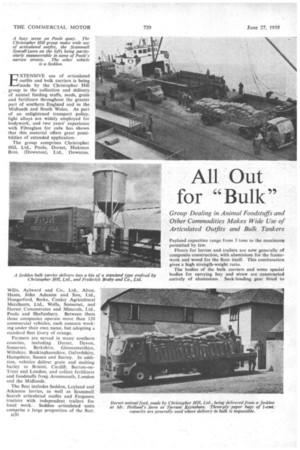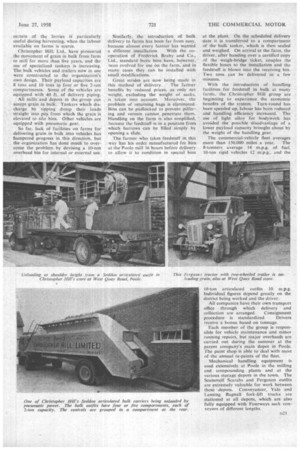All Out for "Bulk"
Page 64

Page 65

If you've noticed an error in this article please click here to report it so we can fix it.
Group Dealing in Animal Foodstuffs and Other Commodities Makes Wide Use of Articulated Outfits and Bulk Tankers
EXTENSIVE use of articulated outfits and bulk carriers is being made by the Christopher Hill group in the collection and delivery of animal feeding stuffs, seeds, grain and fertilizers throughout the greater part of southern England and in the Midlands and South Wales. As part of an enlightened transport policy, light alloys are widely employed for bodywork, and two years' experience with Fibreglass for cabs has shown that this material offers great possibilities of extended application.
The group comprises Christopher Hill, Ltd., Poole, Dorset, Hickman Bros. (Downton), Ltd., Downton.
Wilts, Aylward and Co., Ltd., Alton, Hants, John Adnams and Son, Ltd., Hungerford, Berks, Coxley Agricultural Merchants, Ltd., Wells, Somerset, and Dorset, Concentrates and Minerals, Ltd., Poole and Shaftesbury. Between them these companies operate more than 120 commercial vehicles, each concern working under their own name, but adopting a standard fleet livery of orange.
Farmers are served in many southern counties, including Dorset, Devon, Somerset. Berkshire, Gloucestershire, Wiltshire, Buckinghamshire, Oxfordshire, Hampshire, Sussex and Surrey. In addition, vehicles deliver grain and malting barley to Bristol, Cardiff, Burton-onTrent and London, and collect fertilizers and foodstuffs from Avonmouth, London and the Midlands.
The fleet includes Seddon, Leyland and Atkinson lorries, as well as Scammell Scarab articulated outfits and Ferguson tractors with independent trailers for local work. Seddon articulated units comprise a large proportion of the fleet.
D20 Payload capacities range from 3 tons to the maximum permitted by law.
Floors for lorries and trailers are now generally of composite construction, with aluminium for the framework and wood for the floor itself. This combination gives a high strength-weight ratio.
The bodies of the bulk carriers and some special bodies for carrying hay and straw are constructed entirely of aluminium. Sack-loading gear fitted to certain of the lorries is" particularly useful during harvesting, when the labour available on farms is scarce.
Christopher Hill; Ltd., have pioneered the movement of grain in bulk from farm to mill for more than five years, and the use of specialized tankers is increasing. The bulk vehicles and trailers now in use were constructed to the organization's own design. Their payload capacities are 8 tons and 10 tons in four or five 2-ton compartments. Some of the vehicles are equipped with 40 ft. of delivery piping.
All mills and depots in the group can accept grain in bulk. Tankers which discharge by tipping dump their loads straight into pits from which the grain is elevated to silo bins. Other vehicles are equipped with pneumatic gear.
• So far, lack of facilities on farms for delivering grain in bulk into vehicles has hampered progress in this direction, but the organization has done much to overcome the problem by devising a 10-ton overhead bin for internal or external use.
Similarly, the introduction of bulk -delivery to farms has been far from easy, because almost every farmer has wanted a different installation. With the cooperation of Frederick Braby and Co., Ltd., standard basic bins. have, .however, been evolved for use on the farm, and in many cases they .can be installed with small modifications.
Great strides are now being made in
this method of delivery. The fanner benefits • by -reduced prices, as only net weight, excluding the weight of sacks, is taken into account. .Moredver, the problem of returning bags is eliminated. Bins can be padlocked to prevent pilfer-• ing and vermin. cannot 'penetrate them. Handling on the farm is also simplified, because the feedstuff.is in a position from which barrows can he filled simply by opening a slide.
The farmer who takes feedstuff in this way has his order manufactured for him at the Poole mill 36 hours befoie delivery to allow it to condition in special bins' at the plant. On the scheduled delivery date it is transferred to a compartment of the bulk tanker, which is then sealed and weighed. On arrival at the farm. the driver, after handing over a certified copy of the weigh-bridge ticket, couples the flexible -hoses to the installation and the feedstuff is blown into the receiving bin. Two tons can be delivered in a few minutes, With the introduction of handling facilities for feedstuff in bulk at many farms, the Christopher Hill group are beginning to experience the economic benefits of the system. Turn-round has been speeded up, labour has been reduced and handling efficiency inereased. The • use . of light alloy for bodywork has avoided the possible disadvantage of a lower payload capacity brought about by the weight of the handling,gear.
The commercial-vehicle fleet averages more than 150.000 miles a year. The 8-tonners average 14 m.p.g. of fuel, 10-ton rigid vehicles 12 m.p.g.', and the 10-ton articulated outfits 10 m.p.g. Individual figures depend greatly on the district being worked arid the driver.
All companies have their own transport office through which delivery and collection are arranged. . Consignment procedure is standardized. Drivers receive a bonus based on tonnage.
Each member of the group is responsible for vehicle maintenance and minor running repair's, but major overhauls are carried out during the summer at the parent company's main depot in Poole. The paint shop is able to deal with most of the annual re-paints of the fleet.
Mechanical handling equipment is used extensively at Poole in the milling and compounding plants and at the various storage depots in the town. The Searnmell Scarabs and Ferguson outfits are extremely valuable for work between these depots. Conveyancer, Yale and Lansing Bagnall fork-lift trucks are stationed at all depots, which are also fully equipped with Fourways sack conveyors of different lengths.








































































































































